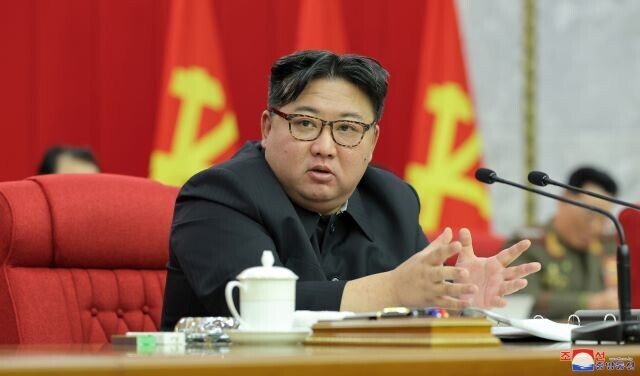hankyoreh
Links to other country sites 다른 나라 사이트 링크
Kim Jong-un admits “terrible situation” in rural areas, pushes for regional development

Kim Jong-un said that “failure to satisfactorily provide the people in local areas with basic living necessities” has emerged as “a serious political issue” in North Korea, according to a report Thursday by the state-run Rodong Sinmun.
During an enlarged meeting of the Political Bureau of the Central Committee of the Workers’ Party of Korea on Jan. 23-24, Kim acknowledged the “terrible situation” much of North Korea faces, in which he said “elementary conditions” aren’t being met. The leader also noted a “severe imbalance and huge gaps” between more rural areas and urban ones in terms of economic potential and living circumstances.
Kim’s remarks came in a speech about his party’s intention to push forward with what it calls the “regional development 20 x 10 policy,” a plan to build manufacturing facilities in 20 cities and counties per two provinces every year for the next 10 years, starting this year.
Kim first referred to the policy during a session of the Supreme People’s Assembly on Jan. 15. During his speech at the time, Kim pledged the “construction of modern regional industry factories in 20 counties every year [. . .] and thus raise on one stage the basic material and cultural living standards of the people in all cities and counties and, in another word, across the country within ten years.”
At the time, Kim said a “section for guiding regional industry construction in the Organizational Leadership Department of the Party Central Committee” would be established, which he would review the work of as his “own responsibility.”
Kim signed an order as the chairman of the Central Military Commission of the Workers’ Party of Korea to mobilize troops from the People’s Army to aid in the construction of factories in the provinces. He also instructed Central Committee members to each take responsibility for the economic development of a city or province in his conclusion on “forcefully promoting” the implementation of the development policy.
The North Korean leader called it an “important principle” of the party to “direct primary efforts to bridging the gaps between urban and rural areas, and central and local areas in all domains, expediting the building of civilized society where everything develops all together, promoting the wellbeing of local people and protecting their rights and interests in particular and improving the regional and rural living circumstances.”
Kim declared the development policy to be “another gigantic revolution for realizing the primary desire of local people and bringing about a radical change in the realm of people’s understanding and the work for fulfilling their centuries-old desire.”
Rodong Sinmun referred to this meeting as the “Mt Myohyang enlarged meeting of the Political Bureau.” The Politburo usually meets at the Workers’ Party of Korea headquarters in Pyongyang, but this meeting was held near Mount Myohyang in Yongbyon County. The location was likely selected to emphasize Kim’s message about bridging the development gap between Pyongyang and the provinces. Mount Myohyang sits at the border of three provinces: North Pyongan, South Pyongan and Chagang.
By Lee Je-hun, senior staff writer
Please direct questions or comments to [english@hani.co.kr]

Editorial・opinion
![[Editorial] Intensifying US-China rivalry means Seoul must address uncertainty with Beijing sooner than later [Editorial] Intensifying US-China rivalry means Seoul must address uncertainty with Beijing sooner than later](https://flexible.img.hani.co.kr/flexible/normal/500/300/imgdb/original/2024/0517/8117159322045222.jpg) [Editorial] Intensifying US-China rivalry means Seoul must address uncertainty with Beijing sooner than later
[Editorial] Intensifying US-China rivalry means Seoul must address uncertainty with Beijing sooner than later![[Column] When ‘fairness’ means hate and violence [Column] When ‘fairness’ means hate and violence](https://flexible.img.hani.co.kr/flexible/normal/500/300/imgdb/original/2024/0516/7417158465908824.jpg) [Column] When ‘fairness’ means hate and violence
[Column] When ‘fairness’ means hate and violence- [Editorial] Yoon must stop abusing authority to shield himself from investigation
- [Column] US troop withdrawal from Korea could be the Acheson Line all over
- [Column] How to win back readers who’ve turned to YouTube for news
- [Column] Welcome to the president’s pity party
- [Editorial] Korea must respond firmly to Japan’s attempt to usurp Line
- [Editorial] Transfers of prosecutors investigating Korea’s first lady send chilling message
- [Column] Will Seoul’s ties with Moscow really recover on their own?
- [Column] Samsung’s ‘lost decade’ and Lee Jae-yong’s mismatched chopsticks
Most viewed articles
- 1For new generation of Chinese artists, discontent is disobedience
- 2[Editorial] Transfers of prosecutors investigating Korea’s first lady send chilling message
- 3[Exclusive] Unearthed memo suggests Gwangju Uprising missing may have been cremated
- 4[Editorial] Intensifying US-China rivalry means Seoul must address uncertainty with Beijing sooner t
- 5S. Korea “monitoring developments” after report of secret Chinese police station in Seoul
- 6N. Korean media upgrades epithet for leader’s daughter from “beloved” to “respected”
- 7Yoon says concern about biased diplomacy is being incited by “communist totalitarian forces”
- 8[Column] US troop withdrawal from Korea could be the Acheson Line all over
- 9Xi, Putin ‘oppose acts of military intimidation’ against N. Korea by US in joint statement
- 1060% of young Koreans see no need to have kids after marriage